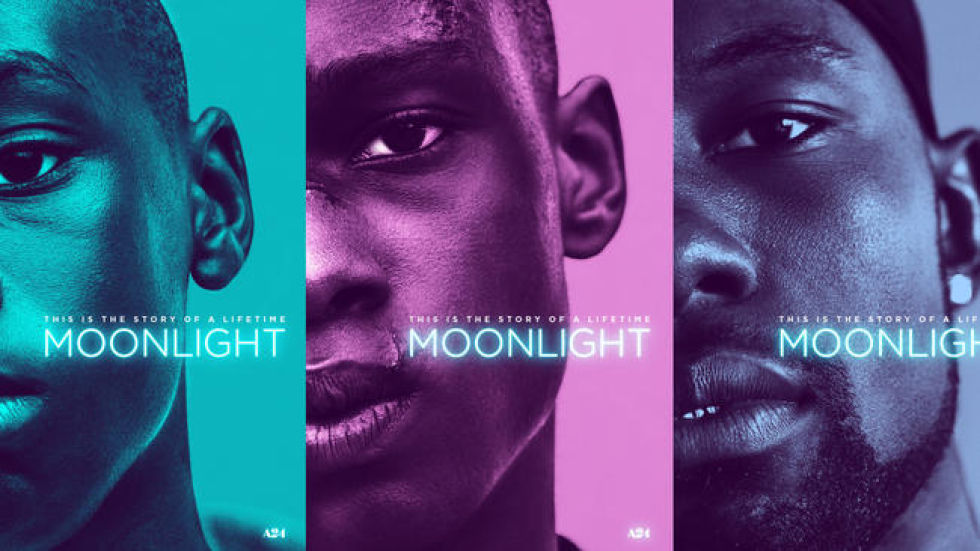Do you ever sit in the theater, watching a movie, and your breath is taken away? In these moments, you know that you are watching something important-- not just personally, but in the realm of filmmaking as a whole. I had been anticipating Moonlight since I saw the trailer months and months ago. Hearing all the raves from fellow film fans, I was itching to see it. And at long last, it opened up an hour away, and so with some friends in tow, I drove to the tiny arthouse theater in Indianapolis to see one of my most anticipated films of 2016. And it was there, almost one week ago today, that I was sucked into this marvel that Barry Jenkins had crafted.
Moonlight chronicles the life of Chiron, an awkward and quiet boy living in a drug and gang-riddled Miami. The film open with him as a child (this chapter called i: Little), then into an adolescent (ii: Chiron), and then finally into adulthood (iii: Black). Unlike a potential companion piece in Boyhood, Moonlight follows Chiron in small increments, these tiny snapshots into his life. And that is precisely what each chapter is filled with: moments. We see Chiron in his day-to-day life, however unfulfilling these are. He becomes a young mentee to cocaine dealer Juan (Mahershala Ali), he is a son to his cocaine addicted mother Paula (Naomie Harris), yet he is also a source of ridicule at school. Whether it is because he is quiet or because he is not like other boys remains unclear. Suffice it to say, Chiron is different. And we are taken on this journey with him-- we can see into this window of Chiron's fears, insecurities, and desires. And this is ultimately a harrowing and beautiful journey.
 |
| Naomi Harris is exceptional here as Paula, Chiron's mother |
It could be so easy to write off Moonlight as the "gay black movie." And believe me, there will be many people who tout it as such. Those same people will call the film important because they have never seen a film like this one. However, whether or not Chiron is gay is not a decision that we as an audience can make. And while I cannot speak for Jenkins, I feel as if this is intentional. Played by three different actors, Chiron hardly speaks. We see what he sees, and these moments are brutal. From his mother screaming at him from down the hallway to children chasing him with rocks, the window to Chiron's soul is his eyes-- and boy, are they expressive. Every aching moment he experiences is clear to us. Alex Hibbert, Ashton Saunders, and Trevante Rhodes are each magnificent in their own way, bringing to light many of these complexities and nuances of Chiron. A man of few words, the film is not so much about Chiron coming out as a gay man. Instead, it is about him verbalizing his desires. It is about him coming to terms with an identity that he feels uncertain about. It is about him finding peace-- with his mother, with himself. The film is a constant struggle, and I mean that in the best way possible. Chiron's struggle is ours as well as his.
Barry Jenkins' direction here is assured and gets under our skin in such a unique way. This is not just a film about race. To say that would ignore the dimensions and wonders that this film holds. And this is represented effectively through the way the film is shot. Chiron is surrounded by a tint of blue, no doubt an intentional thought by Jenkins and cinematographer James Laxton. The camera here is a character in this story, unafraid to get right into the characters' faces, showing us the cracks and imperfections of each of these people. Because of this, it is so easy to see how colors work to shape our understanding of Chiron's world. With this blueness that we are immersed in, one might wonder why Jenkins approached Chiron in this light. Could it be to show us his loneliness, his sadness, his hushed and quiet emotions? Could it coincide with the film's title, adapted from Tarell Alvin McCraney's play In Moonlight Black Boys Look Blue? That could possibly be it-- but when we dig beneath the surface, one thing is clear: this film is not to be just watched and dismissed. Chiron's story is for those who are afraid to live their true selves, their honest selves. It communicates everything through so little.
It is so easy for me to sit here and talk about how important this film is. I loved every second of this world that Jenkins has crafted, and I would love nothing more than to go see it again and dig even deeper into the film's meaning. It is heartbreaking to watch, but there is so much to take in. The performances are stellar, the score and cinematography are exquisite. We are so fortunate that Barry Jenkins told this queer story about a new and unique facet to the queer identity. And for that, all of that, my breath was taken away.

No comments:
Post a Comment